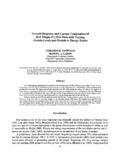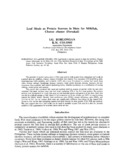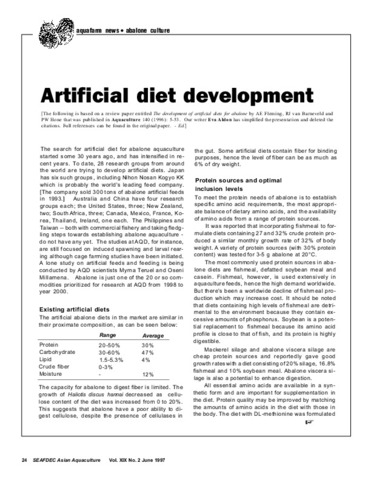Growth response and carcass composition of red tilapia fry fed diets with varying protein levels and protein to energy ratios
Share
Abstract
An 8-week feeding experiment was conducted with red tilapia (Oreochromis ) fry of 0.160 plus or minus 0.035 g initial weight. Twelve diets of 4 protein levels (25, 30, 35 and 40%) and 3 protein to energy (P/E) ratios (111, 100 and 80 mg protein/kcal) at each protein level were used. The highest growth was attained by fry fed a 40% protein diet with a P/E ratio of 111 mg/kcal. A lower but not a significantly different growth response was attained by fry on a 35% protein diet with a P/E ratio of 111 mg/kcal and a 30% protein diet with a P/E ratio of 100. Protein efficiency ratio was affected by the dietary protein level. Feed conversion ratio was not significantly influenced by the dietary protein level nor the P/E ratio. Carcass moisture content (%) was affected only by the P/E ratio. Carcass moisture content was directly related to the P/E ratio of the diets and was inversely related to the digestible energy (DE) level. Both protein level and P/E ratio significantly influenced carcass lipid content (%) on a dry matter basis but not the ash content. Carcass lipid (5) increased with increasing dietary protein and increasing DE levels of the diet, but decreased with increasing P/E ratio. Carcass protein content decreased significantly with the decrease of P/E ratio and increase of DE level of the diet.
Suggested Citation
Santiago, C. B., & Laron, M. A. (1991). Growth response and carcass composition of red tilapia fry fed diets with varying protein levels and protein to energy ratios. In S. S. De Silva (Ed.), Fish Nutrition Research in Asia. Proceedings of the Fourth Asian Fish Nutrition Workshop, 3-8 September 1990, Vijayawada, Andhra Pradesh, India (pp. 55–62). Manila, Philippines: Asian Fisheries Society.
Subject
Collections
Related items
Showing items related by title, author, creator and subject.
-
Evaluation of fish protein concentrate and lactic yeast as protein sources for shrimp feeds
Millamena, O.M.; Triño, A.V. (Asian Fisheries Society, 1994)Protein sources, hydrolyzed fish protein concentrate and plasmolyzed lactic yeast, were used to partially replace fish meal and soybean meal, respectively, in a basal diet (diet 1) at these levels; 5% fish protein concentrate ... -
Leaf meals as protein sources in diets for milkfish Chanos chanos (Forsskal)
Borlongan, I. G.; Coloso, R. M. (Asian Fisheries Society, 1994)The protencial of partial replacement of fish meal protein with protein indigenous leaf meals in practical diets for milkfish, Chanos chanos (Forsskal) was studied. Five isocaloric (375 kcal/100 g diet), isonitrogenous ... -
Artificial diet development [for abalone]
Aldon, Eva (Aquaculture Department, Southeast Asian Fisheries Development Center, 1997)





